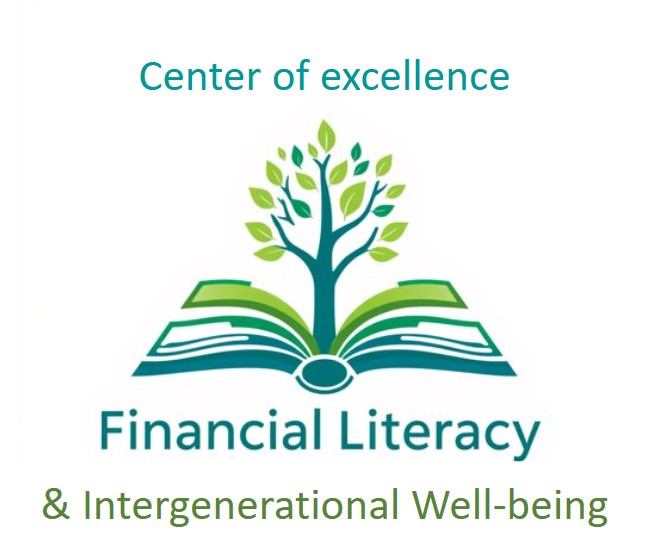Moderation of Intellectual Intelligence on the Effect of Individual Behavior, Modern Living Environment, and Financial Well-Being on Women's Financial Literacy Capacity
 Abstract Views:
722 times
Abstract Views:
722 times
 PDF Downloads:
617 times
PDF Downloads:
617 times
Abstract
Purpose: This study aims to prove that the moderation of intellectual intelligence positively affects individual behavior, the modern living environment, and the financial well-being of women's financial literacy capacity.
Method: The sample in this study consisted of 328 respondents in Indonesia. Data quality testing in this study used Partial Least Square (PLS) analysis, a Structural Equation Modeling (SEM) equation model with a variance-based or component-based structural equation modeling approach.
Result: The study results show that intellectual intelligence cannot moderate the effect of individual behavior on women's financial literacy capacity, but intellectual intelligence can moderate the effect of the modern living environment and financial well-being on women's financial literacy capacity. High intellectual intelligence and utilizing the high intellectual intelligence will increase individual behavior, affecting women's financial literacy capacity. The results of this study recommend that women having good individual behavior and financial well-being in the modern era reinforced by high intellectual intelligence can encourage individuals in Indonesia to increase women's financial literacy capacity.
Downloads
References
Ajzen, I. (1991). The theory of planned behavior. Organizational Behavior and Human Decision Processes, 50(2), 179–211. https://doi.org/10.1016/0749-5978(91)90020-T
Alshebami, A. S., & Al Marri, S. H. (2022). The Impact of Financial Literacy on Entrepreneurial Intention: The Mediating Role of Saving Behavior. Frontiers in Psychology, 13(June), 1–10. https://doi.org/10.3389/fpsyg.2022.911605
Alshebami, A. S., & Aldhyani, T. H. H. (2022). The Interplay of Social Influence, Financial Literacy, and Saving Behaviour among Saudi Youth and the Moderating Effect of Self-Control. Sustainability (Switzerland), 14(14). https://doi.org/10.3390/su14148780
Bonavia, T., & Julián, M. (2022). Effective Behaviors in Work Teams: Spanish Adaptation of the Individual Behavior Analysis Scale. Frontiers in Psychology, 13(March). https://doi.org/10.3389/fpsyg.2022.809731
Clark, R. L., Lusardi, A., Mitchell, O. S., & Davis, H. (2021). Financial Well-being among Black and Hispanic Women. SSRN Electronic Journal, February. https://doi.org/10.2139/ssrn.3792558
Consumer Financial Protection, B. (2021). Measuring the Financial Well-Being of Hispanics 2018 Financial Well-Being Score Benchmarks. 1–20. https://files.consumerfinance.gov/f/201512_cfpb_financial-well-being-user-guide-scale.pdf.
Dagnino-Subiabre, A. (2022). Resilience to stress and social touch. Current Opinion in Behavioral Sciences, 43, 75–79. https://doi.org/10.1016/j.cobeha.2021.08.011
Darriet, E., Guille, M., & Vergnaud, J.-C. (2021). Financial literacy and numeracy. The Routledge Handbook of Financial Literacy, December, 96–109. https://doi.org/10.4324/9781003025221-10
Gallego-Losada, R., Montero-Navarro, A., Rodríguez-Sánchez, J. L., & González-Torres, T. (2022). Retirement planning and financial literacy, at the crossroads. A bibliometric analysis. Finance Research Letters, 44(April 2021). https://doi.org/10.1016/j.frl.2021.102109
Golzarri-Arroyo, L., Dickinson, S. L., Jamshidi-Naeini, Y., Zoh, R. S., Brown, A. W., Owora, A. H., Li, P., Oakes, J. M., & Allison, D. B. (2022). Evaluation of the type I error rate when using parametric bootstrap analysis of a cluster randomized controlled trial with binary outcomes and a small number of clusters. Computer Methods and Programs in Biomedicine, 215, 106654. https://doi.org/10.1016/j.cmpb.2022.106654
Hair, J., & Alamer, A. (2022). Research Methods in Applied Linguistics Partial Least Squares Structural Equation Modeling ( PLS-SEM ) in second language and education research : Guidelines using an applied example. Research Methods in Applied Linguistics, 1(3), 100027. https://doi.org/10.1016/j.rmal.2022.100027
Hanlon, M., Yeung, K., & Zuo, L. (2022). Behavioral Economics of Accounting: A Review of Archival Research on Individual Decision Makers*. Contemporary Accounting Research, 39(2), 1150–1214. https://doi.org/10.1111/1911-3846.12739
Hautamäki, R., & Donner, J. (2022). Modern living in a forest–landscape architecture of Finnish forest suburbs in the 1940s–1960s. Geografiska Annaler, Series B: Human Geography, 104(3), 250–268. https://doi.org/10.1080/04353684.2021.1989320
Keuangan dan Perbankan, J., Tambun, S., Rotua Sitorus, R., & Nurwanti, F. (2022). The Effect of Financial Literacy and Financial Education on Women’s Healthy Financial Behavior through Investment Motivation. Peer-Reviewed Article Jurnal Keuangan Dan Perbankan, 26(2), 2443–2687. https://doi.org/10.26905/jkdp.v26i2.7387
Lin, C. A., & Bates, T. C. (2022). Smart people know how the economy works: Cognitive ability, economic knowledge and financial literacy. Intelligence, 93(June), 101667. https://doi.org/10.1016/j.intell.2022.101667
Lusardi, A., & George, T. (2022). How financial literacy varies among U . S . adults.
Malki, B. (2022). The financial ambidexterity of the immigrant entrepreneurs: a conceptualization. International Journal of Entrepreneurial Behaviour and Research, 28(9), 242–267. https://doi.org/10.1108/IJEBR-12-2021-1003
Mulatningsih, M., Indartono, S., & Efendi, R. (2022). The Effect of Emotional Intelligence and Intellectual Intelligence on Student Discipline. International Journal of Multicultural and Multireligious Understanding, 9(3), 10–16. https://doi.org/10.18415/ijmmu.v9i3.3449
Murzaki, L. A., & Suryandi, L. (2022). eL_Huda, Volume 13, Nomer 01/2022. 13.
Nițoi, M., Clichici, D., Zeldea, C., Pochea, M., & Ciocîrlan, C. (2022). Financial well-being and financial literacy in Romania: A survey dataset. Data in Brief, 43, 108413. https://doi.org/10.1016/j.dib.2022.108413
OECDOECD. (2020). OECD/INFE 2020 International Survey of Adult Financial Literacy. OECD/INFE 2020 International Survey of Adult Financial Literacy, 78. www.oecd.org/financial/education/launchoftheoecdinfeglobalfinancialliteracysurveyreport.htm. (2020). OECD/INFE 2020 International Survey of Adult Financial Literacy. OECD/INFE 2020 International Survey of Adult Financial Literacy, 78. www.oecd.org/financial/education/launchoftheoecdinfeglobalfinancialliteracysurveyreport.htm
Safitri, D., Putra, F. F., & Marini, A. (2020). Ekolabel dan Pendidikan Lingkungan Hidup (p. 121).
She, L., Waheed, H., Lim, W. M., & E-Vahdati, S. (2022). Young adults’ financial well-being: current insights and future directions. International Journal of Bank Marketing, ahead-of-p(ahead-of-print). https://doi.org/10.1108/IJBM-04-2022-0147
Sitthipon, T., Kaewpuang, P., Jaipong, P., Sriboonruang, P., & Siripipattanakul, S. (2022). Artificial Intelligence (AI) Adoption in the Medical Education during the Digital Era: A Review Article. Review of Advanced Multidisciplinary Science, Engineering & Innovation (Ramsey) Ramsey, 1(2), 2022. https://doi.org/10.1016/j.paid.2021.111171
Suchocka, L., Yarasheva, A., Medvedeva, E., Aleksandrova, O., Alikperova, N., & Kroshilin, S. (2022). Modern Media Space and Financial Literacy of Young People. Humanities and Social Sciences Quarterly, 1(1), 61–71. https://doi.org/10.7862/rz.2022.hss.05

This work is licensed under a Creative Commons Attribution 4.0 International License.
Articles published in Journal of Entrepreneurship & Business are licensed under a Creative Commons Attribution 4.0 International (CC BY) license. You are free to copy, transform, or redistribute articles for any lawful purpose in any medium, provided you give appropriate credit to the original author(s) and the journal, link to the license, and indicate if changes were made.
Authors submitting to this journal agree to make their work freely available under the CC BY 4.0 license, ensuring broad dissemination and reuse. The full license details can be accessed at https://creativecommons.org/licenses/by/4.0/.
This ensures that they receive the maximum dissemination because there are no barriers to access. This license allows readers to disseminate and reuse the paper, but always requires them to grant the authors and the first publication full credit.
While JEB upholds ethical publishing standards, the responsibility for ensuring originality and compliance with copyright regulations lies with the authors. The journal is not liable for any legal claims related to the content of published articles.
For further inquiries, please contact the editorial team.

 DOI:
DOI:











